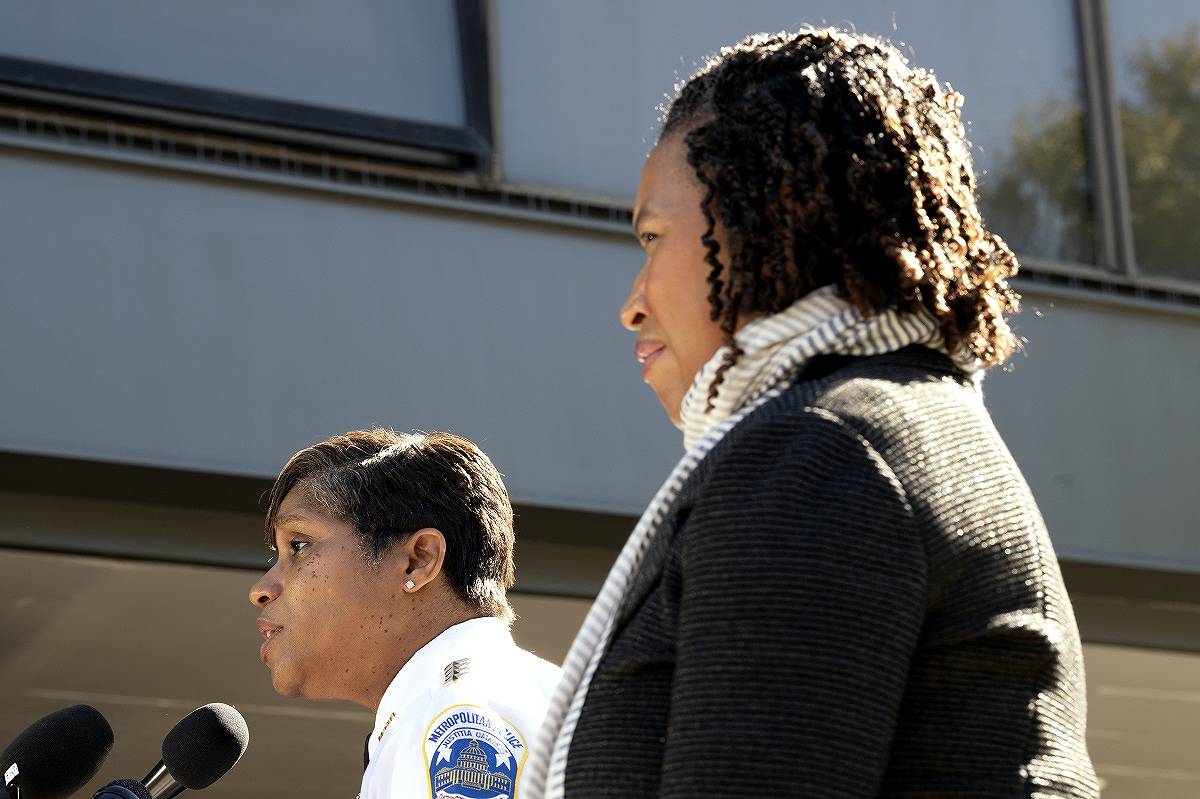
D.C. Mayor Muriel E. Bowser (D) announced a new anti-crime video monitoring center on Thursday.
15:19 JST, December 8, 2023
D.C. police, in partnership with law enforcement across the region, plan to launch a “real-time crime center,” where authorities will work around-the-clock to monitor live video from hundreds of closed-circuit cameras across the city and provide immediate information as officers respond to emergencies.
The RTCC, announced Thursday by D.C. Mayor Muriel E. Bowser (D) and other officials, is expected to open in February and will be staffed 24 hours a day, seven days a week. Local and federal police from across the region, including U.S. Capitol Police and departments in Fairfax, Arlington, Montgomery and Prince George’s counties will be joining the effort.
The announcement comes as robberies and homicides are soaring in the District, and a rise in carjackings has left people across the Washington region on edge. Bowser’s administration is under increasing pressure to curtail violence and restore a sense of safety to the city.
“The goal of this is to respond faster and more efficiently when crime happens in our community,” Bowser said at the Thursday announcement.
Officials said the center would access information from city cameras, emergency calls, ShotSpotter, which detects the sound of gunfire, and other technology. D.C. police Chief Pamela A. Smith said artificial intelligence and facial recognition would not be used.
The idea of monitoring video feeds from cameras is not new. Many police departments, including Baltimore’s, monitor video in real time, concentrating on areas or events that draw large gatherings, active crime scenes and places with spikes in 911 calls.
The American Civil Liberties Union of D.C. immediately raised concerns about how authorities might respond to what they see on video, and whether it could lead to anyone being illegally targeted.
“A center where police watch what people do in the District every hour of every day is an alarming expansion of government surveillance,” ACLU-D.C. Executive Director Monica Hopkins said in a statement. “With no oversight, the real-time surveillance center leaves serious questions about our safety and our rights unanswered. What behavior will police be watching for? What will they do if they think they see it? How will police use what they see, and who will they share it with? And will anyone be there to ensure that police don’t violate people’s rights?”
Smith did not immediately respond to the ACLU’s statement, saying the city was working with its legal team. But Bowser said fears of crime have led residents to welcome security cameras in their neighborhoods.
“When we go to community meetings now, people say, ‘How can I get a CCTV camera in my community?'” Bowser said.
Amtrak police, Metro Transit Police and the United States Secret Service Uniformed Division will also be a part of the center, officials said. The partnering law enforcement agencies have all committed to having representatives in the RTCC, Smith said.
Officials said the FBI, Bureau of Alcohol, Tobacco, Firearms and Explosives and Marshal Service will also support the effort, as will the D.C. Department of Homeland Security and the D.C. Housing Authority.
Officials said they could not immediately provide information on the cost of the center, which will be located in D.C. police headquarters.
Local and federal law enforcement cooperate daily in the District, and often staff the same command center during large events or significant incidents. Officials said having representatives from various agencies participate in the RTCC would improve that communication, including an understanding of regional crime trends.
Smith said investigative personnel would work within the RTCC, which would serve as “the nerve center of law enforcement in the District of Columbia and the surrounding region.”
Smith said the department, which is facing historic staffing shortages, would not take officers off the streets to run the center.
“The real-time crime center will allow us to begin the investigation the moment we receive a call for assistance and allow us to provide timely information to our officers who are working on the ground,” Smith said. “The RTCC will serve as a hub for our local and regional law enforcement partners, helping to share information in real time across jurisdictional boundaries and leveraging expertise with our respective teams.”
The chief said there are about “300 or so” cameras across the District and that the city had announced plans to “double the current cameras” in the city.
Many cameras are in neighborhoods and in the downtown area, all monitoring public spaces. Portable cameras are added for special events, such as presidential inaugurations. The department can also link to cameras used by other public agencies, such as traffic cameras.
But unlike in other cities, D.C. police face numerous restrictions in how they use and monitor what is captured on the cameras. Those restrictions were put in place more than two decades ago for privacy reasons and to address concerns of government overreach. D.C. police said the new effort would not require any changes to current policy.
Bowser said the effort would begin with government-owned cameras, but she also expected partnerships with businesses in the future. She said there already has been a positive response from some business owners amid concerns about burglaries, robberies and other crime.
Bryce Peterson, an adjunct professor at John Jay College of Criminal Justice who has studied police-operated cameras, said real-time crime centers are common at large police departments and can give officers on the street a fuller picture as they respond to the report of a crime.
“When a shooting just occurred and officers get to the scene, they are talking to witnesses in the area, they are looking for shell casings, they are basing everything on what they can see on the scene,” Peterson said. “If you have officers in the RTCC at the same time, they are immediately pulling up maps to see what technology is in the area.”
That broader view may show key details, providing, for instance, video of a car that fled the scene, the direction it headed or even where it is in real time.
“The back-and-forth exchange between the RTCC and officers on the street is where you see the most bang for the buck,” said Peterson, who is also a researcher at CNA’s Center for Justice Research and Innovation.
It could be especially beneficial with the participation of jurisdictions across the D.C. region, resulting in faster coordination when suspects cross between the city and suburbs, he said.
Bowser said one aim was to provide prosecutors with evidence they need to take cases before judges and juries. She noted that cameras in the Metro system have helped with investigations of crimes there.
“Metro Transit has been at the forefront of making sure that its properties are covered. And so I almost know for sure if there’s a crime on a Metro bus or on a platform or a train, that there is going to be good video,” Bowser said.” I want to be as confident about that in other places.”
Fairfax County Police Chief Kevin Davis said a county representative would sometimes be at the center and also would be on call if needed. Davis said his department is forming its own similar real-time crime center.
“There’s huge value in it,” Davis said Wednesday. Baltimore had a real-time crime center called CitiWatch when Davis was police commissioner there from 2015 to 2018.
Davis said staff members can’t monitor hundreds of video feeds at once, but they can concentrate attention on areas experiencing increased crime problems. Those monitors can help direct officers to areas and provide them with valuable intelligence that can be shared instantly.
Davis said such centers are a way to conduct informed, data-based policing that targets crime hot spots, addressing patterns from spikes in shootings, carjacking and even bicycle thefts. He praised Smith for including departments outside the District, a recognition that people who commit crimes often cross regional boundaries.
Top Articles in News Services
-

Survey Shows False Election Info Perceived as True
-

Hong Kong Ex-Publisher Jimmy Lai’s Sentence Raises International Outcry as China Defends It
-

Japan’s Nikkei Stock Average Touches 58,000 as Yen, Jgbs Rally on Election Fallout (UPDATE 1)
-

Japan’s Nikkei Stock Average Falls as US-Iran Tensions Unsettle Investors (UPDATE 1)
-

Trump Names Former Federal Reserve Governor Warsh as the Next Fed Chair, Replacing Powell
JN ACCESS RANKING
-

Producer Behind Pop Group XG Arrested for Cocaine Possession
-

Japan PM Takaichi’s Cabinet Resigns en Masse
-

Man Infected with Measles Reportedly Dined at Restaurant in Tokyo Station
-

Israeli Ambassador to Japan Speaks about Japan’s Role in the Reconstruction of Gaza
-

Videos Plagiarized, Reposted with False Subtitles Claiming ‘Ryukyu Belongs to China’; Anti-China False Information Also Posted in Japan

























